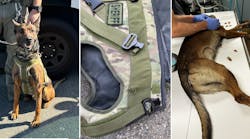When a security guard found Los Angeles County worker Rebecca Wells dead at her desk in her cubicle the day after she died it got media attention. People across the country asked how someone could die in the workplace on a Friday and not be noticed until Saturday afternoon when a security guard was doing his rounds. This story piqued the interest of a friend of mine who has moved up the ranks from a 9-1-1 operator to a cross-trained radio dispatcher and then on up to the supervisor's console. He posted the news story and this status on Facebook, Leadership 101: Make yourself available to your employees every day, walk around, and at least say 'Hello'. This workplace fail is EPIC. Several other operators made comments encouraging him to take his advice and check on them daily. All joking aside, this article and subsequent comments encourages supervisors to look at what it takes to be a good leader, especially in a high-stress environment such as police telecommunications. Three key elements: monitoring, modeling and motivation.
Monitoring
Making the leap from the floor to the supervisor's console can change the nature of a person's relationship with his or her co-workers. Instead of being one of us, you've now entered a world where you're not quite with the workers but also not quite one of the managers either. It's a sort of no man (or woman's) land where you're now required to ensure the quality of the work done by those who you've worked with for years and have often become close friends with.
Another complication in this realm is when you move through the ranks at a pace comfortable for you (you might have only been with the department a few years) and you become the supervisor for some employees who have serious tenure and never had the desire to supervise. These employees could have decades on you both in age and experience. Regardless, a big part of your role as supervisor is to monitor the work of your supervisees.
Going back to Rebecca Wells and my friend's comment, this does mean to check in with your employees frequently. Be aware of what they are working on each day whether it's the 9-1-1 phones or the emergency channel. Know what is happening where they are stationed. This way you keep yourself in the loop when the brass calls and asks you a question, but it also makes you available WITH KNOWLEDGE when your employee needs your assistance with something. This is one of the glorious parts (sarcasm) of being in the one-up-from-the-floor line supervisor status. You have to cater up and down.
Modeling
Within the first couple years after being selected as a supervisor at my communications agency, one supervisor was making quite a name for herself. She had lots of friends on the department especially among those who worked the floor. After she was promoted she continued to go out and socialize with these friends. On several occasions, stories of her extracurricular behavior which often included large amounts of alcohol, less than demure behavior and having to be carried home made it back to work.
During supervision, it was very hard to take what she was saying as a leader seriously when all I could think about was how she acted away from work. It definitely influenced my respect for her and respect is hugely important in the first responder arena. Her behavior outside of work may have in no way influenced her ability to do her job as a supervisor, but it definitely affected her ability to earn the respect of her supervisees.
Modeling good behavior outside of work is one aspect to being a good leader, along with modeling the type of conduct you want your subordinates to emulate at work. Again, knowing what is going on out on the floor is important, as well as knowing how to do the job itself. In my experience, a supervisor who can sit down for line staff at any moment has more respect from the floor than one who doesn't have a clue how to do the work or has become rusty.
Motivation
Although some employees are perfectly happy just coming in, doing the bare minimum to meet expectations and going home at the end of the shift, most want to do a great job and continue to grow as an employee. This might mean moving up the ranks to a supervisory position or going into another division such as training. It might include studying and working out to head into the police academy or going back to school to earn a degree. It might also be to become the best, most attentive, most competent dispatcher or 9-1-1 operator on the floor. Whatever the dreams of your supervisees, an excellent leader motivates them to continue to pursue growth. A true leader does not see forward motion as competition or a threat. They talk to their supervisees and pay attention to the growth that is important to them and they encourage it. A good leader is a guide both professionally and personally. Going back to modeling, this includes continuing to grow as a person and a supervisor as well.
Being a line supervisor in a communications center can be tricky. You're caught between worlds. You have to think like floor staff, as well as management. You have to bring tough, unpopular decisions to the floor, as well as present the needs of the people to those in charge. Often it feels like a no-win situation with very little pay increase and little power. Regardless, many people love it and thrive. Most of these individuals have discovered what it means to be a good leader and incorporate monitoring, modeling and motivation into their supervision. They gain satisfaction from the success and respect of their supervisees.
More information has come out that makes the story of Rebecca Wells a little less strange; she was seen alive at a 5 p.m. meeting and was working late on a Friday and she worked in an isolated cubicle surrounded by vacant cubicles on a predominately vacant floor in the building. At least her story has encouraged supervisors, for example my friend, to re-look, literally, at how he supervises.


